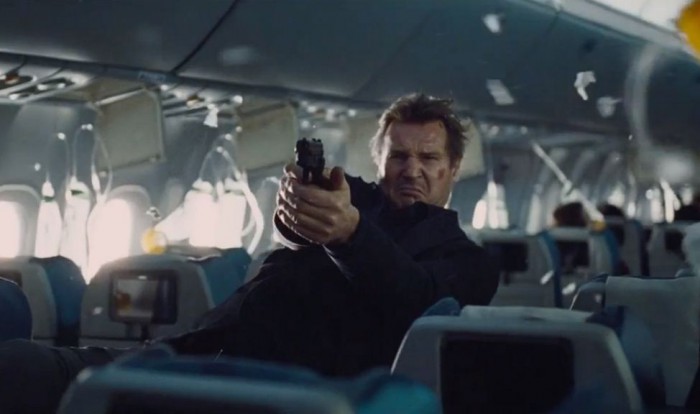Non-Stop
Composed by John Ottman
Varese Sarabande Records
The latest entry in Liam Neeson’s Career Resurgence Extravaganza, Non-Stop has Neeson’s alcoholic air marshal Bill Marks unravel a mysterious bomb threat aboard a flight from New York to London. (Said flight is, in fact, non-stop.) When it’s not withholding key pieces of its mystery, Jaume Collet-Serra’s thriller is both tense and supremely silly — imagine Flightplan’s laser focus on its central character with Speed’s one-upsmanship.
Having previously scored Collet-Serra’s Unknown (also starring Neeson), John Ottman’s no stranger to genre. From Eight-Legged Freaks to Gothika, he’s also scored nearly all of Bryan Singer’s films since the early days of Public Access. His work in Singer’s ill-fated Superman Returns is a standout highlight, showing a deep reverence for John Williams’ importance to the original’s iconography. In short, Ottman has a flexible toolkit, even if his potential range doesn’t always match his past accomplishments.
Varese Sarabande Records’ Non-Stop release leads with Ottman’s title track, a balls-to-the-wall hero theme that unfortunately sets an unfair expectation that this is 110 minutes of Liam Neeson kicking ass. But Non-Stop isn’t really that, nor is its music. “Non-Stop” begins with a steady pulse that sounds like an 8-bit song ripped from a Game Boy cartridge before decisive string thrusts and heroic two-note brass figures create a seriously dogged motive. When the same strings and brass begin pounding away in unison under bubbly synthesizers, the track takes a turn for the cataclysmic as a dastardly plummet second-guesses the more straightforward motive that first introduced it. The effort as a whole might sound like the climax to another superhero movie, but Ottman enriches “Non-Stop” with effervescent piano and an odd time signature that keeps the piece on its toes. You’d like to nod your head to it, but it’ll take a few more listens to get truly comfortable.
In “Damaged Goods,” a wispy piano is spaced out against synthesizer and processed percussion as a mixture of bells and ticks signal the inevitable approach of time. The ticking is a rather obvious addition, but one that adds pensiveness and pressure to the track. Ottman takes the same approach in “Circling Passengers,” this time adding the kind of dissonant hisses, cloudy tones and piano lurches Mark Snow popularized in The X-Files. “Welcome to Aqualand’s” impatience is buttressed by a wandering bass line and restless cellos, and “First Text” presents an unwinding, apathetic approach in playing up Bill Marks’s paranoia and insecurity. Despite its title’s implication, there are no abrupt shrieks or cheap jumps in “First Text.” The panic grows organically.
Ottman’s prime concern is with atmosphere, letting Non-Stop’s twisting (albeit ridiculous) plot do most of the work, but the shrillness in “F*** It” bites and snaps with chomps in the lower strings. The odd time signature in “Non-Stop” also resurfaces in “Random Search.” This time, Ottman quickens the pacing with short bow thrusts and a shortened 3/4 time signature in the melody’s last bar, accelerating everything with more piano, violin, and loads of heavy percussion as the track seems on the brink of folding under its own pressure. Everything is on the line in Non-Stop‘s race against the clock but with a cabin full of passengers, there are few places to start.
The chilly atmosphere is superb, but paradoxically, its highlight remains its title theme, one which never actually surfaces in the film until credits roll. “Non-Stop’s” ordering on the album makes for a bit of a false advertisement, but its downward spiral also ingeniously doubles as an outline for Non-Stop’s literal flight plan. It’s tough to tell whether Ottman’s work deserved a better film or if it excels precisely because it flies so low.
— David Klein

